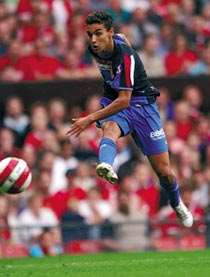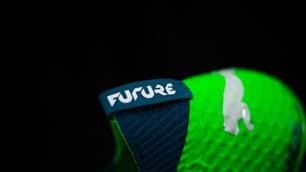10 to watch in 2007
Page 8 of 13 | Single page
Meet the direct, pacy winger who suffers panic attacks in public. Good job his table-topping team are rarely on the telly, then
AGE 21
CLUB Sevilla
POSITION Winger
LOWDOWN Assists, pace and delivery make him Spain’s next big thing
He may have only just turned 21 but Jesus Navas has already won the UEFA Cup, been a regular in the Sevilla first team for two seasons, and racked up over 100 games for the leaders of La Liga – statistically the best club in the world. He has been described by the country’s best-selling newspaper as a “superstar who is the heart and soul of Sevilla”, the man whose “electric play and wonderful assists on the right wing fill the Sanchez Pizjuan week after week.”
And still football fans could be forgiven for knowing little about him. After all, beyond Real Madrid and Barcelona, the rest of Spain’s clubs struggle to get noticed by many people and Sevilla are not in the Champions League, having missed out on goal difference last season. As for Navas, he has not been on television, he barely does interviews and has not yet played for Spain. In Seville, he’s been talked about for years; outside the city, he has yet to take the stage his special talent deserves.
Short and slight with a boyish look and piercing blue eyes, like the rest of his team-mates Navas went unwatched this season as Sevilla took the league by storm and their president took the television companies by the balls, insisting that no cameras would enter the Pizjuan until the offers improved dramatically. “It was a shame,” Navas says softly, almost imperceptibly, when FourFourTwo meets him in the pouring rain at the club’s training ground out on the Utrera road. “Because we were playing pretty well and hardly anyone got to see us.”
Pretty well? That’s an understatement and a half. With the cameras banned, Sevilla put opponents to the sword in devastating, swashbuckling style. By the time a TV deal was struck and the cameras finally returned, they had overthrown Barcelona at the top, with Navas their star man, tearing up and down the wing at the speed of light, providing assist after assist.
Long considered to be the new improved Jose Antonio Reyes, the Andalucian artist, an old-fashioned winger, Navas joined Sevilla at 13 and was destined for the top. The pair are best friends and Navas admits that he sees himself in the Reyes mould. “My style is his style,” he says, “it’s about pace, running at people, wanting the ball. It’s very direct – the kind of football people love here in Andalucia.”
Except that Navas is better than Reyes. Pablo Blanco is the ex-player running Sevilla’s youth system, a man who knows about talent. “Navas’s football is the very embodiment of exquisite finery: he has enormous ability and great variety,” he says. “Some say he has a physical weakness, but that just makes him even more of a footballer, in pure form – like Johan Cruyff. He has great mental strength and the pace, talent and bravery to go at people again and again. He will triumph.”
Even so, when then coach Joaquin Caparros put Navas in the first team in November 2003, some considered it a gamble. Not Caparros. “Players make first-team debuts for one simple reason: they are good enough,” he said. “I like to bet on a winning horse. And anyone would bet on Jesus Navas.”
Caparros’s successor, Juande Ramos, certainly would. Indeed, the arrival of Ramos has heralded a more creative style – one Navas admits “suits” him – that has brought the very best out of the youngster. “With so few out-and-out wingers around, having Jesus is fantastic for the team,” Ramos insists. “He will always beat his marker, giving us a real advantage.”
“He may look like a little boy but he’s so, so dangerous,” adds Denmark international Christian Poulsen, who joined Sevilla in the summer. “He’s very good technically and he’s incredibly quick; Navas could be a star in Spain and well beyond.”

Yet still Navas has not played for Spain, despite coach Luis Aragones proclaiming he is destined to be “one of the biggest footballers in the country”. Aragones has wanted Navas in the squad for a long time but has been unable to select him because the winger suffers from serious anxiety attacks, even having to leave one Spanish U21 get-together because he couldn’t cope.
Sevilla, who asked Aragones not to pick Navas, are helping the winger get over those attacks by providing him with treatment and counselling. He does not travel with the team on long trips away, instead joining them just in time for the games, and slowly but surely he is making progress.
With an international call-up now expected next spring – possibly even for the friendly against England at Old Trafford in February – 2007 is pencilled in as the year Navas announces his arrival. And when he does, rest assured, he will do so in style.
“He’s in the process of overcoming the problems that have prevented him being one of the best players in the world already,” says Ramos. “And as soon as he has the chance to establish himself amongst the elite, people will see him for the fantastic talent he is. It’s just a matter of time before the rest of the world discovers what people in Spain already know: that this kid is a superstar.”
It’s just one of a catalogue of eulogies, but is Navas really as good as they say? “No,” says Freddie Kanoute, smiling as he shelters from the rain. “He’s better.”
AGE 21
CLUB Sevilla
POSITION Winger
LOWDOWN Assists, pace and delivery make him Spain’s next big thing
He may have only just turned 21 but Jesus Navas has already won the UEFA Cup, been a regular in the Sevilla first team for two seasons, and racked up over 100 games for the leaders of La Liga – statistically the best club in the world. He has been described by the country’s best-selling newspaper as a “superstar who is the heart and soul of Sevilla”, the man whose “electric play and wonderful assists on the right wing fill the Sanchez Pizjuan week after week.”
And still football fans could be forgiven for knowing little about him. After all, beyond Real Madrid and Barcelona, the rest of Spain’s clubs struggle to get noticed by many people and Sevilla are not in the Champions League, having missed out on goal difference last season. As for Navas, he has not been on television, he barely does interviews and has not yet played for Spain. In Seville, he’s been talked about for years; outside the city, he has yet to take the stage his special talent deserves.
Short and slight with a boyish look and piercing blue eyes, like the rest of his team-mates Navas went unwatched this season as Sevilla took the league by storm and their president took the television companies by the balls, insisting that no cameras would enter the Pizjuan until the offers improved dramatically. “It was a shame,” Navas says softly, almost imperceptibly, when FourFourTwo meets him in the pouring rain at the club’s training ground out on the Utrera road. “Because we were playing pretty well and hardly anyone got to see us.”
Pretty well? That’s an understatement and a half. With the cameras banned, Sevilla put opponents to the sword in devastating, swashbuckling style. By the time a TV deal was struck and the cameras finally returned, they had overthrown Barcelona at the top, with Navas their star man, tearing up and down the wing at the speed of light, providing assist after assist.
Long considered to be the new improved Jose Antonio Reyes, the Andalucian artist, an old-fashioned winger, Navas joined Sevilla at 13 and was destined for the top. The pair are best friends and Navas admits that he sees himself in the Reyes mould. “My style is his style,” he says, “it’s about pace, running at people, wanting the ball. It’s very direct – the kind of football people love here in Andalucia.”
Except that Navas is better than Reyes. Pablo Blanco is the ex-player running Sevilla’s youth system, a man who knows about talent. “Navas’s football is the very embodiment of exquisite finery: he has enormous ability and great variety,” he says. “Some say he has a physical weakness, but that just makes him even more of a footballer, in pure form – like Johan Cruyff. He has great mental strength and the pace, talent and bravery to go at people again and again. He will triumph.”
Even so, when then coach Joaquin Caparros put Navas in the first team in November 2003, some considered it a gamble. Not Caparros. “Players make first-team debuts for one simple reason: they are good enough,” he said. “I like to bet on a winning horse. And anyone would bet on Jesus Navas.”
Caparros’s successor, Juande Ramos, certainly would. Indeed, the arrival of Ramos has heralded a more creative style – one Navas admits “suits” him – that has brought the very best out of the youngster. “With so few out-and-out wingers around, having Jesus is fantastic for the team,” Ramos insists. “He will always beat his marker, giving us a real advantage.”
“He may look like a little boy but he’s so, so dangerous,” adds Denmark international Christian Poulsen, who joined Sevilla in the summer. “He’s very good technically and he’s incredibly quick; Navas could be a star in Spain and well beyond.”

Yet still Navas has not played for Spain, despite coach Luis Aragones proclaiming he is destined to be “one of the biggest footballers in the country”. Aragones has wanted Navas in the squad for a long time but has been unable to select him because the winger suffers from serious anxiety attacks, even having to leave one Spanish U21 get-together because he couldn’t cope.
Sevilla, who asked Aragones not to pick Navas, are helping the winger get over those attacks by providing him with treatment and counselling. He does not travel with the team on long trips away, instead joining them just in time for the games, and slowly but surely he is making progress.
With an international call-up now expected next spring – possibly even for the friendly against England at Old Trafford in February – 2007 is pencilled in as the year Navas announces his arrival. And when he does, rest assured, he will do so in style.
“He’s in the process of overcoming the problems that have prevented him being one of the best players in the world already,” says Ramos. “And as soon as he has the chance to establish himself amongst the elite, people will see him for the fantastic talent he is. It’s just a matter of time before the rest of the world discovers what people in Spain already know: that this kid is a superstar.”
It’s just one of a catalogue of eulogies, but is Navas really as good as they say? “No,” says Freddie Kanoute, smiling as he shelters from the rain. “He’s better.”
Related Articles

PUMA reveals new 'Stun Pack'

PUMA Future 18.1 up close













